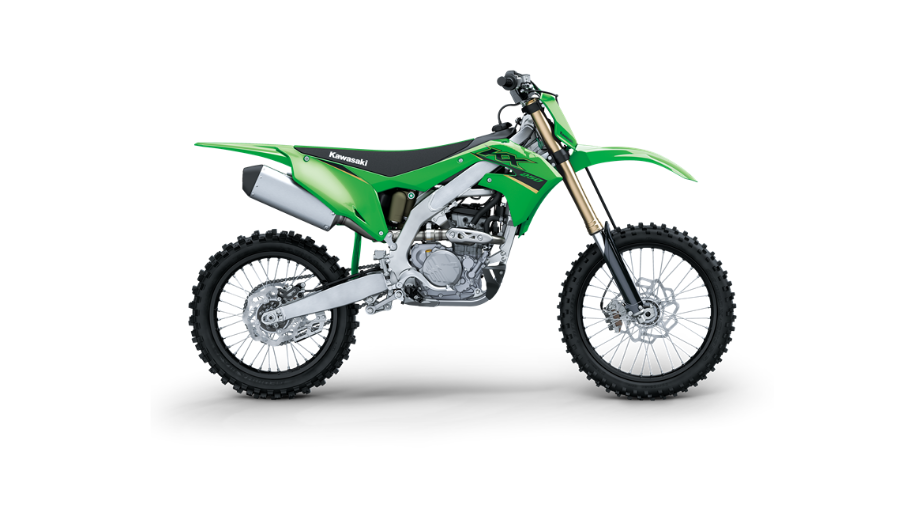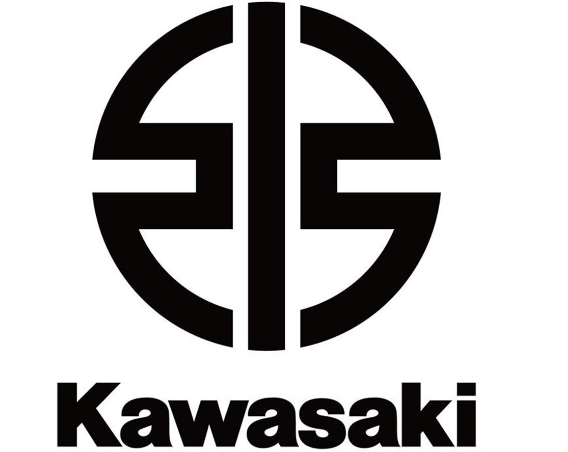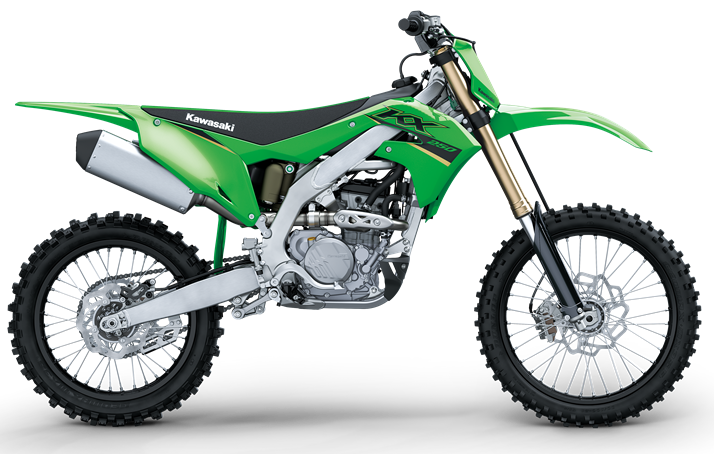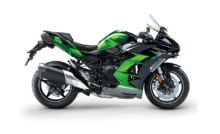2022 Kawasaki KX250 Throttle Body Assembly Owners Manual




2022 Kawasaki KX250 Throttle Body Assembly


Throttle Body Assembly
ldle Speed Adjustment
- Thoroughly warm up the engine.
- Turn the idle adjusting screw/choke knob to adjust the idle speed 2 250 2 350 r/min (rpm) by using the engine revolution tester (The tester should be followed by the method described by the manufacture.).
A. Idle Adjusting Screw/Choke Knob
B. Tester
- Open and close the throttle a few times to make sure the idle speed does not change and readjust if necessary.
- With the engine idling, turn the handlebars both ways and check if handlebars movement changes
the idle speed. If so, the throttle cable may be improperly adjusted, incorrectly routed, or damaged. Be sure to correct any of these conditions before riding.
WARNING
Operation with damaged cables could result in unsafe riding conditions. Replace damaged control cables before operation.
NOTICE
This motorcycle’s radiator does not incorporate a cooling fan. Prolonged idling of the engine with no airflow through the radiator can cause coolant loss and engine overheating resulting in possible engine damage. Any riding conditions that increase engine temperature will further reduce idling time be- fore coolant loss occurs. These conditions include high ambient temperature, sandy or muddy terrain, or other conditions causing high engine loads at low speeds. Furthermore, warming the engine up excessively be- fore operation, or leaving idling with the hot engine temperature after operation results in the engine overheating, too.
Cleaning the Throttle Body Assembly
- Remove the seat (see Spark Plug section).
- Remove the left side cover (see Air Cleaner section).
- Remove the right side cover (see Exhaust System section).
- Remove the fuel tank (see Spark Plug section).
- Loosen the muffler clamp bolt.
- Remove the muffler mounting bolts, and pull out the muffler body backward.
A. Muffler Clamp Bolt
B. Muffler Mounting Bolts
C. Muffler Body
- Disconnect the negative (-) cable from the negative (-) terminal.
- Slide the red cap from the positive (+) terminal.
- Disconnect the positive (+) cable from the positive terminal.
- Remove the bolts, collars and the battery holder.
- Take the battery with the battery case.
A. Red Cap
B. Negative (-) Terminal
C. Positive (+) Terminal
D. Bolts
E. Collarss
F. Battery Holder
G. Battery
Remove the starter relay.
A. Starter Relay
- Open the clamps.
- Slide the dust cover, and disconnect the intake air temperature sensor connector.
A. Clamps
B. Dust Cover
C. Intake Air Temperature Sensor Connector
- Open the clamp.
- Remove the main relay.
- Free the main harness and starter motor cable from the clamp.
A. Clamp
B. Main Relay
C. Main Harness
D. Starter Motor Cable
Slide the dust cover, and disconnect the upstream fuel injector connector
A. Dust Cover
B. Upstream Fuel Injector Connector
- Be sure to place a piece of cloth around the fuel hose joint.
- Wipe off the dirt on the surface around the connection using a cloth or a soft brush.
- Insert a flat tip screwdriver into the slit on the joint lock.
A. Cloth
B. Flat Tip Screwdriver
C. Joint Lock
- Turn the screwdriver to disconnect the joint lock.
- Disconnect the fuel hose joint from the delivery pipe.
A. Turn
B. Joint Lock
C. Fuel Hose Joint
- Cover the delivery pipe and the fuel hose joint with the vinyl bags to keep them clean.
- Loosen the air cleaner duct clamp bolt.
A. Air Cleaner Duct Clamp Bolt
- Remove the rear frame mounting bolts on both sides.
- Pull the rear frame rearward with the air cleaner housing.
A. Rear Frame Mounting Bolts (Both Sides)
B. Air Cleaner Housing
- Disconnect the throttle sensor connector.
- Disconnect the intake air pressure sensor connector.
A. Throttle Sensor Connector
B. Intake Air Pressure Sensor Connector
- Disconnect the downstream injector connector.
- Open the clamp.
- Loosen the throttle body assy holder clamp bolt.
- Pull the throttle body assy from the holder.
A. Downstream Injector Connector
B. Throttle Body Assy Holder Clamp Bolt
C. Clamp
Remove the throttle pulley cover bolt, and take off the throttle pulley cover.
A. Throttle Pulley Cover Bolt
B. Throttle Pulley Cover
- Loosen the decelerator cable bolt locknut, and free the tip of cable lower end.
- Loosen the accelerator cable bolt, and free the tip of cable lower end.
- Remove the throttle body assy.
A. Decelerator Cable Bolt Locknut
B. Accelerator Cable Bolt
C. Tips of Throttle Cable Lower Ends
D. Accelerator Cable
E. Decelerator Cable
NOTICE
Never drop the throttle body assy especially on a hard surface. Such a shock to the body assy can damage it.
- After removing the throttle body assy, cover the throttle body assy holder and air cleaner duct with a clean cloth to protect them from dirt.
- Clean the throttle body assy.
- Check the throttle bore at the throttle valve for carbon deposits by opening the throttle valve.
- If any carbon accumulates, wipe the carbon off the throttle bore and the throttle valve, using a lint-free cloth penetrated with a high flash-point solvent.
A. Throttle Bore
NOTICE
If dirt gets through into the engine, excessive engine wear and possibly engine damage will occur. Lubricate the lower ends of the throttle cables.
- Install the tip of accelerator cable lower end to the throttle pulley.
- Install the accelerator cable so that the position of the claw of the washer is as shown.
- Tighten the accelerator cable bolt to the specified torque.
A. Accelerator Cable Lower End
B. Throttle Pulley
C. Claw of Washer
D. Accelerator Cable Bolt
Tightening Torque
Accelerator Cable Bolt: 3.0 Nm (0.31 kgfm, 27 in lb)
- Install the tip of decelerator cable lower end to the throttle pulley.
- While holding the decelerator cable bolt, tighten the cable bolt locknut to the specified torque.
A. Decelerator Cable Lower End
B. Decelerator Cable Bolt
c. Decelerator Cable Bolt Locknut
Tightening Torque
Decelerator Cable Bolt Locknut: 3.0 Nm (0.31 kgfm, 27 in-lb) Install the throttle pulley cover and tighten its bolt to the specified torque.
Tightening Torque
Throttle Pulley Cover Bolt: 4.0 Nm (0.41 kgfm, 35 in-lb)
WARNING
Operation with improperly adjusted, incorrectly routed, or damaged cables could result in an unsafe riding condition. Be sure the control cables are adjusted and routed correctly and are free from damage.
- Place the throttle body assy in rear of the cylinder head.
- Run the throttle sensor lead and the water temperature sensor lead to the right side of the throttle body assy holder.
- Install the throttle body assy to the throttle body assy holder. Align the projection with the groove.
- Check the throttle body assy is installed securely.
A. Throttle Body Assy
B. Projection
C. Groove
Tighten the throttle body assy clamp bolt to the specified torque.
Tightening Torque
Throttle Body Assy Clamp Bolt: 1.1 Nm (0.11 kgfm, 10 in lb)
- Run the downstream injector lead to the rearward of the throttle sensor.
- Connect the downstream injector connector.
- Run the throtle sensor lead to the inward of the water temperature sensor lead into the clamp.
A. Downstream Injector Connector
B. Throttle Sensor Lead
C. Water Temperature Sensor Lead
D. ClamP
Connect the intake air pressure sensor connector and throttle sensor connector.
A. Throttle Sensor Connector
B. Intake Air Pressure Sensor Connector
Position the air cleaner duct clamp as shown.
A. Air Cleaner Duct Clamp
B. Air Cleaner Housing
- Install the rear frame with the air cleaner housing to the throttle body assy.
- Check the duct is installed securely.
- Tighten the air cleaner duct clamp bolt to the specified torque.
Tightening Torque
Air Cleaner Duct Clamp Bolt 3.5 Nm (0.36 kgf m, 31 in-lb) Tighten the rear frame mounting bolts according to the following specified tightening sequence [14].
Tightening Torque
Rear Frame Mounting Bolts: 35 N-m (3.6 kgf-m, 26 ft-lb)
- Check the joint lock for deformation and wear.
- If the joint lock is deformed, replace the fuel hose with a new one.
- Insert the fuel hose joint straight onto the delivery pipe
- Push the joint lock until the hose joint clicks.
A. Fuel Hose Joint
B. Joint Lock
NOTICE
When installing the fuel hose joint, do not apply strong force to the delivery pipe on the throttle body assy. The pipe made from resin could be damaged.
Push and pull the fuel hose joint back and forth more than two times, and make sure it is locked and does not come off.
A. Fuel Hose Joint
B. Push and Pull
WARNING
Leaking fuel can cause a fire or explosion resulting in serious burns. hose joint is installed correctly on the deliv ery pipe by sliding the joint. Make sure the
NOTE
lf it comes off, reinstal the fuel hose joint.
Connect the upstream fuel injector connector.
A. Upstream Fuel Injector Connector
- Run the main harness and starter motor cable into the clamp.
- Install the main relay.
A. Starter Motor Cable
B. Main Harness
C. Clamp
D. Main Relay
- Run the starter motor cable into the clamps.
- Connect the intake air temperature sensor connector.
A. Starter Motor Cable
B. Clamps
C. Intake Air Temperature Sensor Connector
Install the starter relay.
A. Starter Relay
- Place the battery case and battery.
- Install the battery holder and collars, and tighten the bolts.
- Connect the positive (+) cable to the positive (+) terminal.
- Cover the positive (+) terminal with the red cap.
- Connect the negative (-) cable to the negative (-) terminal.
A. Battery Case
B. Battery
C. Battery Holder
D. Collars
E. Bolts
F. Positive (+) Terminal
G. Negative (-) Terminal
H. Red Cap
Tightening Torque
Battery Terminal Screws: 4.5 N m (0.46 kgf m, 40 in-lb)
- Install the fuel tank (see Spark Plug section).
- Install the muffler (see Exhaust System section).
- Install the removed parts.
- Open and close the throttle a few times to make sure the grip operates correctly.
- Check the throttle cable play and idle speed adjustment.
Recent Posts
VW Jetta Engine Fuse Box Diagram
Access the comprehensive 2010-2018 VW Jetta Passenger Fuse Box Diagram to troubleshoot electrical issues effectively.…
VW Jetta Passenger Fuse Box Diagram
Explore the comprehensive VW Jetta Passenger Fuse Box Diagram to troubleshoot electrical issues effectively. Understand…
2023 Ford F-150 Lightning Fuse Box Diagram
Under Hood Fuse Box Location Remove the front luggage compartment cover. Under Hood Fuse Box…
2022 Kawasaki NINJA H2 SX SE Brake Lever Adjuster Owner’s Manual
2022 Kawasaki NINJA H2 SX SE Brake Lever Adjuster Owner's Manual NOTICE Only adjust the front…
2023 Land Rover Range Rover Evoque Exiting The Vehicle Owners Manual
2023 Land Rover Range Rover Evoque Exiting The Vehicle SINGLE LOCKING WARNING Before exiting the…
2023 Land Rover Range Rover Evoque Front Seats Owners Manual
2023 Land Rover Range Rover Evoque Front Seats FRONT SEAT SAFETY Make sure to read…
